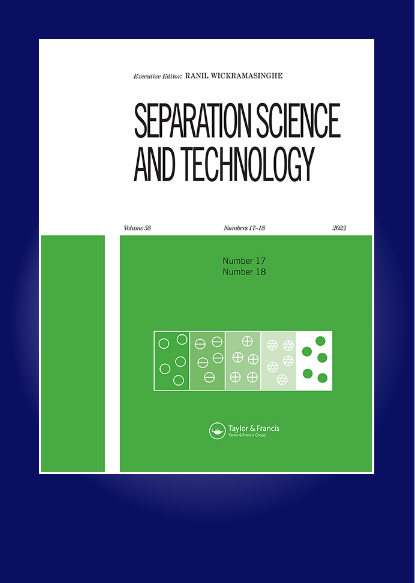Highly efficient and selective 99TcO 4 – uptake from reprocessing low-level liquid waste using a zirconium-based metal−organic framework
IF 2.3
4区 工程技术
Q3 CHEMISTRY, MULTIDISCIPLINARY
引用次数: 0
Abstract
ABSTRACTEfficient and selective sequestration of pertechnetate ions (99TcO4–) from nuclear low-level waste (LLW) solution is very much desirable for the safe treatment of radioactive liquid waste. However, the separation of specific radionuclides from competitors is a huge challenge in separation science. In the nuclear fuel cycle, 99TcO4– is one of troublesome fission products due to long half-life, large inventory in spent fuel, significant radiation hazards, and high environmental mobility of 99TcO4– ions. Recently, the metal−organic framework (MOFs) has shown significant potentials toward 99TcO4– removal. So far, most of the studies were reported using ReO4– ions, an inactive surrogate of 99TcO4– ions, and very few MOF materials are applied for real-time 99TcO4– sequestration from nuclear waste solution in the presence of extreme conditions. Herein, we report 99TcO4– ion removal from low-level liquid nuclear waste solution using zirconium-based metal−organic framework UIO-66-NH2. The material has exhibited fast kinetics and record selectivity toward 99TcO4– ions, making the adsorbent highly promising.HIGHLIGHTS Successful synthesis of zirconium-based metal−organic framework UIO-66-NH2/UIO-66-NH3+ was carried out using the solvothermal method.Characterization of zirconium-based metal−organic framework UIO-66-NH2/UIO-66-NH3+ was carried out using PXRD, SEM, EDX, and elemental analysis.An ion exchange study of 99TcO4– ions was carried out with low-level waste (LLW) solution.UIO-66-NH2/UIO-66-NH3+ has exhibited fast kinetics and record selectivity toward 99TcO4– ions with low-level waste (LLW) solution.Feasibility and selectivity study of the TcO4− extraction process with nuclear reprocessing low-level waste (LLW) solution.KEYWORDS: UiO-66-NH2/NH3+ MOFseparation99TcO4– ionsnuclear waste solution AcknowledgmentsThe authors acknowledge U. Dani, G.M, R &WM, BARC (T), Dr. H.Pal, Professor, Homi Bhabha National Institute & Former Associate Director, Chemistry Group, BARC, Mumbai, and Dr. Biswajit Sadhu, Scientific Officer, HPD, BARC, Mumbai.Disclosure statementNo potential conflict of interest was reported by the author(s).Author informationAll the authors have given permission to the final version of the manuscript.利用锆基金属有机骨架从低浓度废液后处理中高效、选择性地吸收99tco4
摘要:高效、选择性地从低放射性核废料(LLW)溶液中分离高盐离子(99TcO4 -)是安全处理放射性废液的重要手段。然而,从竞争对手中分离特定的放射性核素是分离科学中的一个巨大挑战。在核燃料循环中,99TcO4 -由于半衰期长、乏燃料存量大、辐射危害大、99TcO4 -离子的环境流动性高,是一个麻烦的裂变产物。近年来,金属有机骨架(MOFs)在去除99TcO4 -方面表现出了显著的潜力。到目前为止,大多数研究都是使用ReO4 -离子作为99TcO4 -离子的非活性替代物,很少有MOF材料用于在极端条件下实时封存核废料溶液中的99TcO4 -。本文报道了利用锆基金属-有机骨架UIO-66-NH2去除低浓度液态核废料溶液中的99TcO4离子。该材料对99TcO4 -离子表现出快速的动力学和创纪录的选择性,使其具有很高的应用前景。采用溶剂热法成功合成了锆基金属-有机骨架UIO-66-NH2/UIO-66-NH3+。采用PXRD、SEM、EDX和元素分析对锆基金属-有机骨架UIO-66-NH2/UIO-66-NH3+进行了表征。用低浓度废液对99TcO4 -离子进行了离子交换研究。UIO-66-NH2/UIO-66-NH3+在低浓度废物(LLW)溶液中对99TcO4 -离子表现出快速的动力学和创纪录的选择性。核后处理低浓度废物(LLW)溶液提取TcO4−工艺的可行性和选择性研究。作者感谢U. Dani, G.M, R & wm, BARC (T), H.Pal博士,教授,Homi Bhabha国家研究所和前副主任,BARC,化学组,孟买,和Biswajit Sadhu博士,科学官员,HPD, BARC,孟买。披露声明作者未报告潜在的利益冲突。作者信息所有作者都同意稿件的最终版本。
本文章由计算机程序翻译,如有差异,请以英文原文为准。
求助全文
约1分钟内获得全文
求助全文
来源期刊

Separation Science and Technology
工程技术-工程:化工
CiteScore
6.10
自引率
3.60%
发文量
131
审稿时长
5.7 months
期刊介绍:
This international journal deals with fundamental and applied aspects of separation processes related to a number of fields. A wide range of topics are covered in the journal including adsorption, membranes, extraction, distillation, absorption, centrifugation, crystallization, precipitation, reactive separations, hybrid processes, continuous separations, carbon capture, flocculation and magnetic separations. The journal focuses on state of the art preparative separations and theoretical contributions to the field of separation science. Applications include environmental, energy, water, and biotechnology. The journal does not publish analytical separation papers unless they contain new fundamental contributions to the field of separation science.
 求助内容:
求助内容: 应助结果提醒方式:
应助结果提醒方式:


